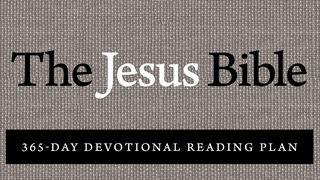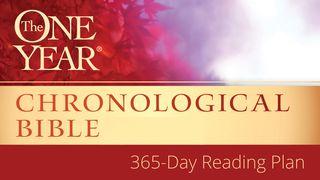The Bible with Nicky and Pippa Gumbel, Classic Version, 2015Sample

Listening to the Holy Spirit
Will Wisbey was a successful young estate agent. He was fiercely sceptical of Christianity. One Sunday in April 2007 a friend invited him to an evening service at HTB. During that service, someone had a ‘word of knowledge’ that went like this: ‘There is a man here who is expecting a soft-top sports car to be delivered in the next two days. He has worked all his life so hard to achieve success. Work has been his life. He’s got the car, the house, the lifestyle, and he‘s not happy. And God wants him to know that there’s something more important for him to focus on.’
Subsequently Will wrote, ‘I couldn’t believe it. My new car was arriving in two days’ time and I hadn’t told anyone. I was earning £100k a year. My work was my life. The car was the nicest I’d bought and it was arriving in literally two days. That night, for the first time in my life, I really prayed.’
Will encountered Jesus Christ and was filled with the Holy Spirit. He says, ‘Now I know Jesus does exist. He loves me and he is with me.’
Many of us live in a busy and noisy world. In the midst of all the noise, talk and distractions how do we hear the voice of the Holy Spirit?
Proverbs 20:15-24
1. Listen to wisdom and knowledge
One of the ways in which you can hear the voice of the Holy Spirit is through the wise advice of others. Wise and knowledgeable people are invaluable. ‘Gold there is, and rubies in abundance, but lips that speak knowledge are a rare jewel’ (Proverbs 20:15). Or as The Message puts it, ‘Drinking from the beautiful chalice of knowledge is better than adorning oneself with gold and rare gems’ (v.15, MSG).
Seek help when making important decisions: ‘Make plans by seeking advice’ (v.18). You will still be responsible for your actions though: ‘Form your purpose by asking for counsel, then carry it out using all the help you can get’ (v.18, MSG).
The book of Proverbs is itself full of wise advice. It tells you to be careful of the gossips who betray confidence, and to avoid people who talk too much. ‘Gossips can’t keep secrets, so never confide in blabbermouths’ (v.19, MSG). One well-known gossip had this maxim embroidered on her cushion: ‘If you haven’t got anything good to say about anyone come and sit by me’!
Another piece of wise advice is the warning against taking revenge, ‘Don’t ever say, “I'll get you for that!” Wait for God; he’ll settle the score’ (v.22, MSG).
Listening to the Holy Spirit means listening to the Word of the Lord. ‘A person’s steps are directed by the Lord. How then can any understand their own way?’ (v.24). Listen to the Spirit as he speaks to you through the Scriptures.
Lord, thank you for these words of wisdom and knowledge. Thank you that your Holy Spirit speaks to me through the Scriptures such as the Proverbs I read today. Help me to hear and obey your voice.
1 Corinthians 14:1-19
2. Listen through the gifts of the Holy Spirit
As we saw yesterday, by exalting love Paul is not in any way downplaying the importance of the gifts of the Holy Spirit. He is emphasising both: ‘Follow the way of love and eagerly desire spiritual gifts, especially the gift of prophecy’ (v.1). Some people say that we should desire the Giver and not the gifts, but the Giver tells us to desire the gifts.
Prophecy is one of the gifts of the Holy Spirit through which the Spirit speaks to the church. In this passage Paul emphasises the importance of this gift for the church. It is even more important than speaking in tongues: ‘I would like every one of you to speak in tongues, but I would rather have you prophesy’ (v.5a).
Although Paul was speaking into a situation where the gift of tongues was in danger of misuse, he was still remarkably positive about the use of the gift of speaking in tongues. Paul says that those who pray in tongues edify themselves (v.4). It is a good gift for everyone (v.5). Tongues is a way of praying in the Spirit (v.14) and is primarily thanks and praise (vv.16–17). He wrote, ‘I thank God that I speak in tongues more than all of you’ (v.18).
Paul makes a distinction between the use of the gift in private (which he generally encourages) and the use of the gift publicly in the church. If one speaks in tongues in church there needs to be an interpretation (vv.5,18–19). When it is used together with the gift of interpretation it becomes the equivalent of prophecy (v.5b).
The gift of interpretation enables the church to be edified after a tongue has been given publicly (v.5). All those with the gift of tongues should pray for this gift also so that the church can be edified.
Prophecy is the ability to hear what God is saying and pass it on to others. It is a spiritual gift of very high importance in the church, and should be eagerly desired (v.1). It is not necessarily about the future. Usually it is a forth telling rather than a foretelling.
The early Christians came to see the Old Testament as essentially prophecy (see, for example, 2 Peter 1:20). The Old Testament is the prophetic witness to Jesus. The New Testament is the apostolic witness to Jesus. There is no equivalent today in terms of authority.
The words of prophets today are not of equal authority with the prophets and apostles whose words form the Scriptures. Scripture is for all Christians, in all places, at all times. A prophetic word is a particular word, inspired by God, given to a particular person or persons, at a particular moment, for a particular purpose. It is a human, and sometimes partially mistaken, report of something that the Holy Spirit has brought to someone’s mind.
Nevertheless, as we have seen Paul places a very high value on the gift of prophecy (1 Corinthians 14:1) because it is a gift that builds up the church (v.4) and can also have an impact on those who are ‘unbelievers’: ‘If an unbeliever ... comes in while everybody is prophesying ... the secrets of their hearts will be laid bare. So they will fall down and worship God, exclaiming, “God is really among you!” ’ (vv.24–25). That is exactly what happened to Will Wisbey.
Prophecy needs to be tested: ‘Two or three prophets should speak, and the others should weigh carefully what is said’ (v.29).
- Is it in line with the Bible?
God is not going to contradict himself. - What is the character of the prophet?
Are they a person of love? (14:1). - What is the effect of the prophecy?
Paul writes, ‘Those who prophesy speak to people for their strengthening, encouragement and comfort (v.3). True prophetic words will always be positive in the sense that they will strengthen, encourage and comfort people.
On the whole, prophetic words are confirming what the Holy Spirit has already placed in our hearts. If you are unsure about a prophetic word, do not act hastily but do what Mary, the mother of Jesus, did – wait and ponder it in your heart.
Lord, help us as a church to create an atmosphere of expectation to hear the Holy Spirit speak to us as we listen – following the way of love and eagerly desiring the spiritual gifts.
2 Chronicles 10:1-12:16
3. Listen to good advice and prophetic words
Rehoboam made a big mistake. The Holy Spirit spoke to him through the elders. They said, ‘If you will be a servant to this people, be considerate of their needs and respond with compassion, work things out with them, they’ll end up doing anything for you’ (10:7, MSG).
Rehoboam made the mistake of rejecting the advice of the elders (v.8). He listened instead to some extremely bad advice from the young men he had grown up with. He told the people ‘My father thrashed you with whips; I’ll beat you bloody with chains!’ (v.11b, MSG).
He ‘did not listen to the people’ (v.15). When all Israel saw that ‘the king refused to listen to them’ (v.16), they rebelled.
But God did not give up speaking to Rehoboam. The ‘word of the Lord came to Shemaiah the man of God’ and he was told to go and tell Rehoboam, ‘This is what the Lord says …’ (11:2–4a).
This time the king and the people were unified in listening to the Lord – ‘they obeyed the words of the Lord and turned back from marching against Jeroboam’ (v.4b).
Later, God spoke again through the prophet Shemaiah: ‘God’s word: “You abandoned me; now I abandon you” ’ (12:5, MSG). Again, they listened. They ‘humbled themselves and said, “The Lord is just.” ’ (v.6). As a result, ‘When the Lord saw that they humbled themselves, this word of the Lord came to Shemaiah: “Since they have humbled themselves, I will not destroy them but will soon give them deliverance …” ’ (v.7).
Lord, we need great wisdom in hearing your voice and knowing which advice is from the Spirit of God and which is not. Help us to distinguish between good and bad advice. Help us to hear the voice of the true prophets and to reject the advice of the false ones.
Pippa Adds
1 Corinthians 14:4
‘Those who speak in a tongue edify themselves.’
When a friend was asked some years ago whether she would like the gift of tongues, she replied, ‘If it helps.’ I need all the help I can get. I am so grateful to God for this gift as many times, when I have been unable to articulate what I’m feeling, I have used this gift to pour out what is on my heart.
Notes:
Unless otherwise stated, Scripture quotations taken from the Holy Bible, New International Version Anglicised, Copyright © 1979, 1984, 2011 Biblica, formerly International Bible Society. Used by permission of Hodder & Stoughton Publishers, an Hachette UK company. All rights reserved. ‘NIV’ is a registered trademark of Biblica. UK trademark number 1448790.
Scripture quotations marked (AMP) taken from the Amplified® Bible, Copyright © 1954, 1958, 1962, 1964, 1965, 1987 by The Lockman Foundation. Used by permission. (www.Lockman.org)
Scripture marked (MSG) taken from The Message. Copyright © 1993, 1994, 1995, 1996, 2000, 2001, 2002. Used by permission of NavPress Publishing Group.
About this Plan

Start your day with the Bible in One Year, a Bible reading plan with commentary by Nicky and Pippa Gumbel. Nicky Gumbel is the Vicar of HTB in London and pioneer of Alpha. ‘My favourite way to start the day.’ – Bear Grylls ‘My heart leaps every morning when I see Bible in One Year by @nickygumbel sitting in my inbox.’ – Darlene Zschech, Worship Leader
More
We’d like to thank HTB for their generosity in providing the Bible in One Year. For more information please visit: www.bibleinoneyear.org
Related Plans

The NIV 365-Day Devotional Reading Plan

Digging Deeper Daily: By Daily Bible Reading Podcast

7 Hebrew Words Every Christian Should Know

Pray

What Is God’s Purpose For My Life?

The Jesus Bible Reading Plan

Worship Changes Everything

The Forty-Day Word Fast

The One Year® Chronological Bible
